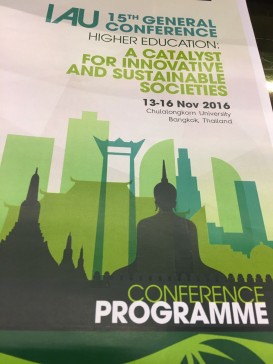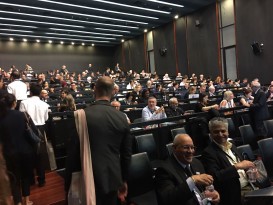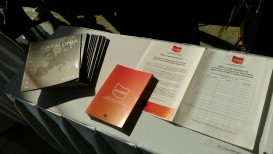RRI, pleonasm or indispensable prefix for sustainable education? HEIRRI at the IAU General Conference
The IAU 15th General Conference ‘Higher Education: A catalyst for innovative and sustainable societies’, held on 13-16th November 2016 in Bangkok, Thailand, focuses on sharing strategies and practices that demonstrate how higher education institutions contribute to innovation and sustainability.
The Higher Education Institutions and Responsible Research and Innovation project (HEIRRI) was at the session on the 14th November under the title “Responsible Research and Innovation, pleonasm or indispensable prefix for sustainable education?“. Josep M. Vilalta, executive secretary of the Associació Catalana d'Universitats Públiques (ACUP) and executive director of Global University Network for Innovation (GUNi) and Go Yoshizawa, Associated Professor, Universitat d'Osaka, were the speakers in a debate chaired by Marta Cayetano, communications officer, Associació Catalana d'Universitats Públiques (ACUP)
The principle of Responsible Research and Innovation (RRI) has become an increasingly important concept of research and innovation policy. Adding “responsible” to research and innovation asks for a reflection on what R+I without the additional R stands for in today’s societies. Is R+I on its own not “responsible” enough to contribute to achieving sustainable societies and tackling global challenges? The session will debate the following questions, inviting experts from Asia to share their visions on this issue to go beyond the European perspective. How can the needs and expectations of society be put at the centre of the R+I process? How can HEIs play a role in shaping this way of understanding R+I, and what changes have to be introduced in the formal and informal education of future scientists, engineers and other professionals involved in the R+D process? What has to change in the science – society interface in order to make all R+I responsive and responsible and contribute to sustainable development? Would RRI represent an interesting and relevant topic for international membership organisations like IAU to work on?


